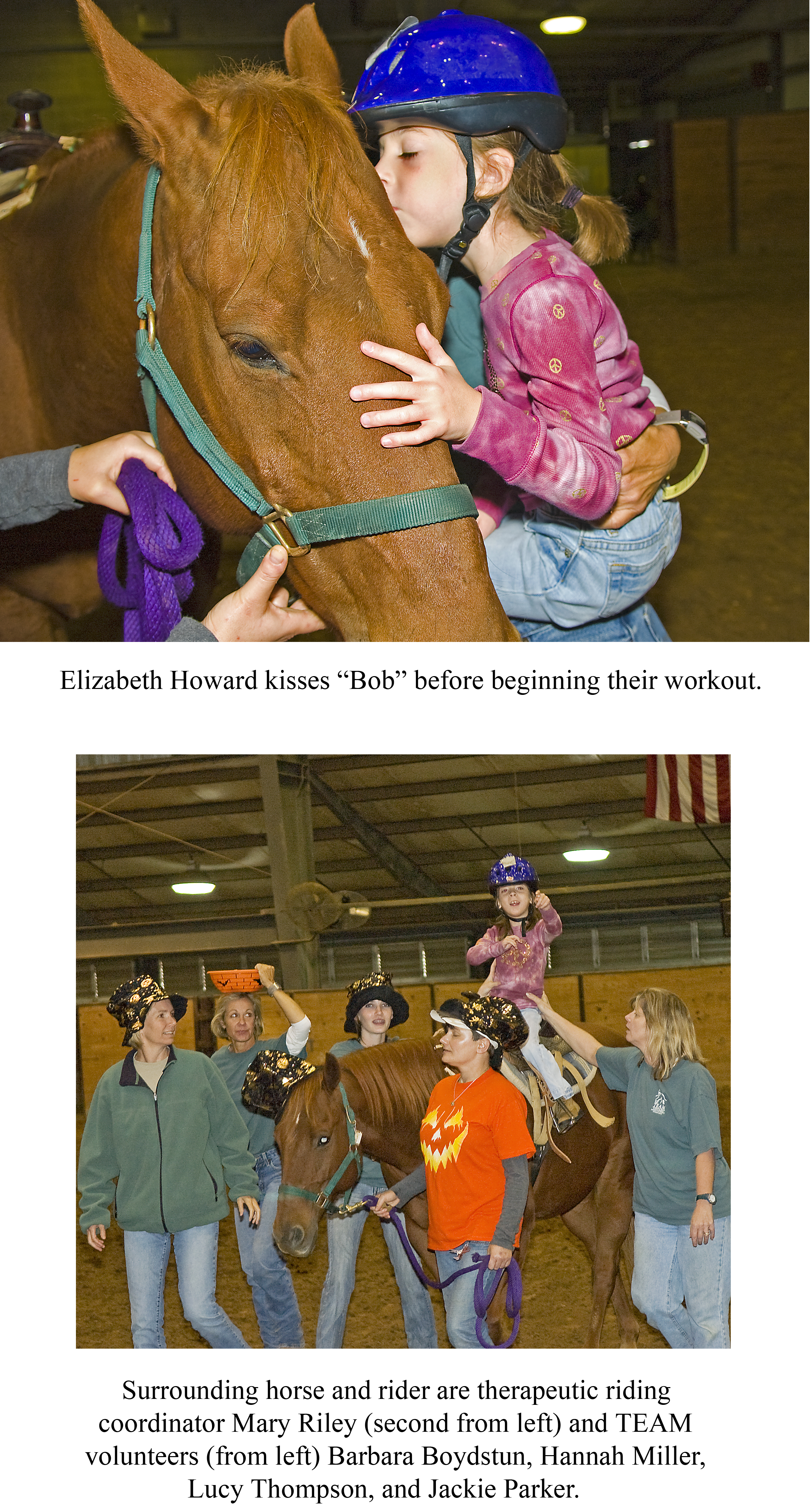Contact: Kenneth Billings

STARKVILLE, Miss.--As "Bob" enters the room, young Elizabeth Howard bursts into giggles of sheer anticipation about the next hour the pair will spend together.
His size is no intimidation to the 7-year-old born with cerebral palsy who, though she struggles to walk, has no problem making the gentle giant heed her commands. While "Bob" is neither a schoolmate nor a playground acquaintance, he is very special.
"Bob" is one of four horses used in a six-week therapeutic riding program sponsored twice annually by the Mississippi State University Extension Service for physically and mentally challenged children and adults. He stands quietly as Howard places reins over his ears and calmly takes direction to lead him around the arena with the assistance of a volunteer from the Mississippi Horse Park.
Titled TEAM for short, the Therapeutic Equine Activity Member program is a local educational training model based on guidelines established by the North American Riding for the Handicapped Association. Designed to educate and promote the practice of therapeutic riding, it's conducted in the spring and fall at the Mississippi Horse Park, which is affiliated with the land-grant university.
TEAM is one of only two such accredited programs in the state, said Mary Riley, the extension service's 4-H TEAM program coordinator and instructor.
"The whole idea is to foster independence for people with disabilities," the former guidance counselor said. "Using the horse as an activity tool, it is possible to work on varying levels of independence for physical strengthening and improved posture, as well as building their self confidence."
Horses are especially beneficial for individuals like Howard who have weakened torsos and upper bodies. Riding stimulates the nerves and muscles in much the same way walking would, Riley explained.
"A horse's gait mimics the gait of the human walk," she said. "All of the trunk and body muscles are stimulated in the same way as if they were walking and no equipment has ever been created that can do that."
Individuals like Elizabeth Howard often spend considerable time in hospitals or clinics receiving therapy to stretch muscles and exercise joints for increased mobility. To that end, Riley said therapeutic riding, though not a replacement for regular therapy, can provide much of the same benefits in a different setting.
Elizabeth's mother agrees.
"Riding gives her the benefits of many things she does in a clinic, but in an atmosphere that seems more fun than work," Brenda Howard said. "She is very weak through the trunk and this helps her work on her balance, muscle control and strengthening her trunk core."
Underscoring the physical benefits of the program are the intangibles each rider experiences as he or she bonds with the particular animal assigned for the duration of the program.
"They have a special kind of relationship," Brenda Howard observed. "She is always talking about 'Bob.' She tells everyone about the things they do together."
Despite its obvious benefits, the program does have a technical limit for participants. Because of the Mississippi Horse Park's full, year-round events schedule, the therapeutic training must be limited to the spring and fall.
"Other programs are typically run year round, but we are not able to do that," Riley said. "We are hoping to eventually reach that level of activity, but it isn't possible right now." As a result, participation must be limited to nine riders age 4 and up, she added.
Happily, applications currently are being accepted for the 2008 spring session, tentatively scheduled for March. In addition to a $10-per-session fee, participants must present a physician-signed release form certifying the rider has no condition that might be aggravated by riding or being around horses.
To ensure everyone involved is properly trained, the extension service sponsors an extensive training program for volunteers, as well as certification classes for potential instructors.
For more information about volunteering with TEAM or to register for the spring session, contact Riley at 662-325-1695 or mriley@ext.msstate.edu.
For more information about Mississippi State University, see http://www.msstate.edu/.